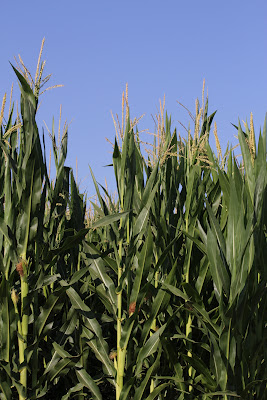 |
| Corn in the Central Valley |
The smells of the air were so distinctive all along the way. The smell of hay, or at least dried, cut grasses, was dominant until north of Sacramento. There I noticed a pungent, almost bitter smell that was heavy, making breathing a bit challenging. Not that I couldn't breath, just that I was aware of my lungs pumping. I did not know what it was, until I made a wrong turn looking for a Wildlife Refuge. I drove along this country road and noticed a small biplane swooping in low, banking sharply, then reversing its trajectory. I swung my car to the side of the road, and hopped out with my camera. Sure enough it was spraying up and down the fields south of the road. I'll be that was the smell. It was disturbing, because there I was, there people in their cars were, and there were the field hands laboring in the neighboring fields.
It was a bit disturbing. This, of course, brought up thoughts of Monsanto and patented (!) seeds, loss of small farmers, monoculture, GMO foods and Monsanto, water rights and dams, and So Cal desperate for water, salmon struggling, heirloom seeds and native food heritage, agri-business and buying avocados and persimmons from Mexico when they are grown in my own back yard.
 |
| Biplane spraying north of Sacramento |
No comments:
Post a Comment